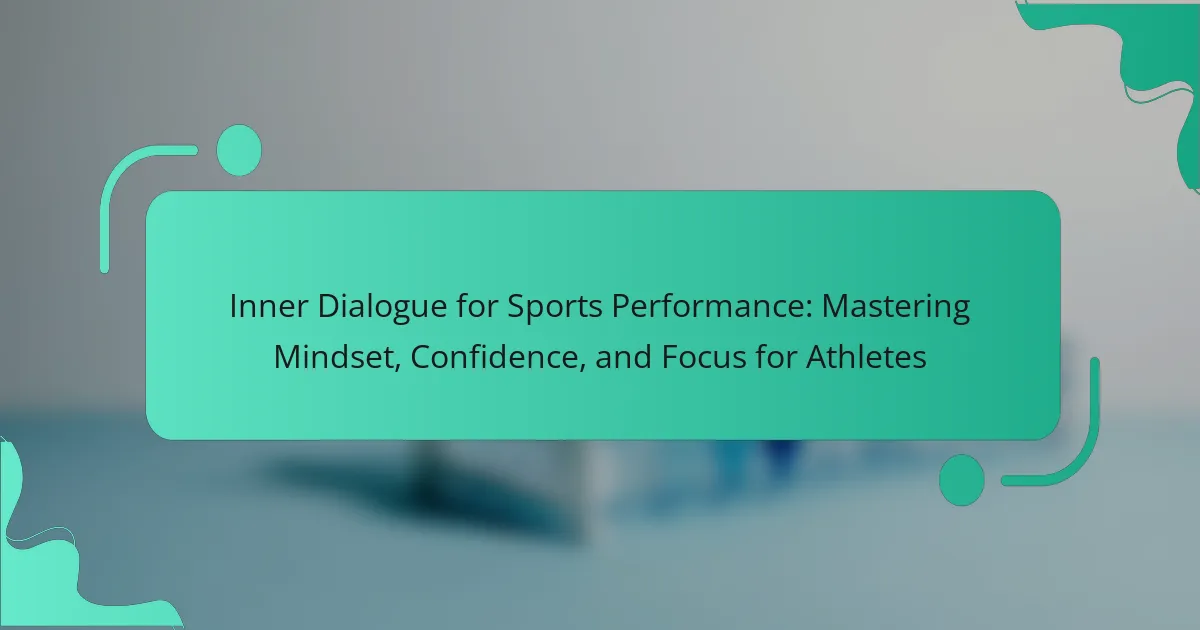Mastering inner dialogue is crucial for athletes aiming to enhance their performance. Positive self-talk boosts mindset, confidence, and focus. Techniques like visualization and mindfulness can help overcome negative thoughts. Consistent practice of these strategies fosters resilience and a growth mindset, essential for competitive success.

What is Inner Dialogue and How Does It Impact Sports Performance?
Inner dialogue significantly impacts sports performance by shaping an athlete’s mindset, confidence, and focus. Positive inner dialogue enhances motivation and reduces anxiety, leading to improved performance outcomes. Research indicates that athletes who engage in constructive self-talk experience greater focus and resilience during competition. Mastering this mental skill can differentiate top performers from their peers, as it fosters a proactive approach to challenges. Developing effective inner dialogue strategies involves consistent practice and self-awareness, which are essential for achieving peak performance.
Why is Self-Talk Crucial for Athletes?
Self-talk is crucial for athletes as it enhances mindset, boosts confidence, and improves focus. Positive inner dialogue can lead to better performance and resilience during competitions. Research shows that athletes who engage in constructive self-talk experience reduced anxiety and increased motivation. This mental strategy is essential for maintaining a competitive edge and achieving peak performance.
How Does Inner Dialogue Shape Mindset?
Inner dialogue significantly influences an athlete’s mindset, shaping confidence and focus. Positive self-talk enhances performance by reinforcing belief in abilities. It cultivates resilience, enabling athletes to overcome challenges. Research indicates that athletes with constructive inner dialogue often achieve higher levels of success. This mental strategy is crucial for maintaining concentration during competitions, ultimately leading to improved outcomes.
What Role Does Confidence Play in Athletic Success?
Confidence significantly enhances athletic success by improving focus and performance under pressure. Athletes with a strong inner dialogue can visualize success, leading to better outcomes. Research shows that positive self-talk can increase perseverance and resilience, essential traits in competitive sports. Furthermore, athletes who cultivate confidence often experience reduced anxiety, allowing for optimal performance during critical moments.

What Are the Universal Benefits of Positive Self-Talk?
Positive self-talk enhances sports performance by boosting confidence, focus, and resilience. Athletes who engage in constructive inner dialogue report improved mental clarity and reduced anxiety. For instance, a study found that positive affirmations can lead to a 15% increase in performance metrics. This mindset shift fosters a unique attribute of resilience, enabling athletes to overcome challenges effectively. Furthermore, consistent positive self-talk cultivates a growth mindset, allowing for continuous improvement and adaptation in competitive environments.
How Does Positive Self-Talk Enhance Focus?
Positive self-talk significantly enhances focus by promoting a positive mindset and reducing anxiety. This mental strategy enables athletes to concentrate on their performance rather than distractions. Studies show that athletes who engage in positive self-talk can improve their focus by up to 20%, leading to better outcomes during competitions. By reinforcing confidence and motivation, positive self-talk acts as a unique attribute that directly influences an athlete’s ability to maintain concentration under pressure.
What Are the Psychological Benefits of Effective Inner Dialogue?
Effective inner dialogue enhances psychological resilience, boosts confidence, and sharpens focus in athletes. It fosters a positive mindset, enabling better performance under pressure. Athletes using constructive self-talk report improved motivation and reduced anxiety, which leads to enhanced overall performance. Studies indicate that athletes who engage in effective inner dialogue experience a unique attribute of increased mental clarity, allowing for quicker decision-making during competitions. This mental strategy is crucial for maintaining composure and achieving peak performance levels.

What Unique Strategies Can Athletes Use to Improve Self-Talk?
Athletes can enhance self-talk by employing strategies like visualization, positive affirmations, and mindfulness. Visualization involves mentally rehearsing successful performances, which can reinforce confidence. Positive affirmations help in countering negative thoughts, promoting a resilient mindset. Mindfulness techniques allow athletes to remain present, reducing anxiety and improving focus. These unique strategies contribute significantly to mental resilience, a crucial attribute for peak performance.
How Can Visualization Techniques Enhance Inner Dialogue?
Visualization techniques significantly enhance inner dialogue by improving an athlete’s mindset, confidence, and focus. These techniques allow athletes to mentally rehearse performances, reinforcing positive self-talk and reducing anxiety. Research shows that visualization can lead to a 20% increase in performance metrics. Athletes who regularly practice visualization report heightened self-efficacy and clarity in their goals. By creating vivid mental images of success, athletes can transform their inner dialogue into a powerful tool for achieving peak performance.
What Role Do Affirmations Play in Sports Performance?
Affirmations significantly enhance sports performance by fostering a positive mindset, boosting confidence, and improving focus. Athletes using affirmations report increased resilience and reduced anxiety during competitions. This mental training tool helps create a strong inner dialogue that aligns with performance goals. Research shows that consistent affirmation practice can lead to improved outcomes, such as faster recovery times and better overall performance metrics.

What Rare Techniques Are Used by Elite Athletes for Inner Dialogue?
Elite athletes use rare techniques for inner dialogue that enhance mindset, confidence, and focus. These methods include visualization, self-talk scripts, and mindfulness practices.
Visualization involves creating mental images of successful performances, which can boost confidence and reduce anxiety. Self-talk scripts are personalized phrases athletes repeat to reinforce positive beliefs and focus. Mindfulness practices help athletes stay present, reducing distractions and enhancing performance.
These techniques are not commonly used by all athletes, making them unique tools for those seeking to gain a competitive edge.
How Do Professional Athletes Use Self-Talk in High-Pressure Situations?
Professional athletes use self-talk to enhance performance under pressure by fostering a positive mindset and boosting confidence. This technique helps them maintain focus and manage anxiety. Athletes often employ specific phrases or mantras that reinforce their skills and remind them of past successes. Research indicates that effective self-talk can improve concentration and reduce stress, ultimately leading to better performance outcomes. For example, a study showed that athletes who engaged in positive self-talk experienced a notable increase in their performance metrics compared to those who did not.
What Specific Phrases Do Top Athletes Use?
Top athletes often use phrases that reinforce their mindset, confidence, and focus. Common phrases include “I am strong,” “I can do this,” and “Stay present.” These affirmations help cultivate a positive inner dialogue, enhancing performance. Athletes tailor their phrases to individual needs, emphasizing unique attributes like resilience and determination. For example, Olympic athletes might say, “Every second counts,” reflecting their focus on precision and timing. These specific phrases serve as mental cues, guiding athletes through challenges and maintaining motivation.
What Innovations in Mental Training Are Emerging in 2025?
Innovations in mental training for athletes in 2025 focus on enhancing inner dialogue, which boosts mindset, confidence, and focus. Emerging technologies, such as AI-driven mental coaching apps, personalize training by analyzing performance data and offering tailored mental strategies. Virtual reality simulations create immersive environments for athletes to practice mental resilience and visualization techniques. Neurofeedback devices monitor brain activity, enabling athletes to optimize their mental states in real-time. These advancements aim to bridge the gap between mental and physical performance, fostering a holistic approach to sports training.

How Can Athletes Overcome Negative Self-Talk?
Athletes can overcome negative self-talk by implementing positive affirmations and visualization techniques. These strategies enhance mindset, boost confidence, and improve focus.
Positive affirmations involve repeating encouraging phrases that reinforce self-belief and capability. Research shows that affirmations can lead to improved performance by fostering a growth mindset. Visualization allows athletes to mentally rehearse successful outcomes, which can reduce anxiety and increase confidence during competition.
Additionally, mindfulness practices help athletes stay present and reduce the impact of negative thoughts. Techniques such as deep breathing and meditation can create mental clarity, enabling athletes to shift focus from self-doubt to performance.
Regularly engaging in these practices can transform an athlete’s inner dialogue, leading to sustained improvements in sports performance.
What Are Common Triggers for Negative Inner Dialogue?
Negative inner dialogue in athletes often stems from common triggers such as fear of failure, comparison to others, and self-doubt. These triggers can undermine confidence and focus, impacting sports performance. Fear of failure may lead to overthinking, while comparisons can create unrealistic expectations. Self-doubt often arises from past mistakes or negative feedback, reinforcing a cycle of negativity. Addressing these triggers is essential for mastering mindset and enhancing performance.
How Can Athletes Reframe Negative Thoughts?
Athletes can reframe negative thoughts by employing positive self-talk and visualization techniques. These methods help shift focus from doubts to confidence. For instance, replacing “I can’t do this” with “I am prepared and capable” enhances mental resilience. Research indicates that positive affirmations can boost performance by reducing anxiety and improving focus. Additionally, maintaining a growth mindset allows athletes to view challenges as opportunities for improvement, fostering a more constructive inner dialogue.

What Best Practices Should Athletes Follow for Effective Self-Talk?
Athletes should engage in positive self-talk to enhance performance, confidence, and focus. Techniques include using affirmations, visualizing success, and reframing negative thoughts. These practices help cultivate a growth mindset, crucial for overcoming challenges. Consistent application can lead to improved mental resilience and competitive edge.
How Can Journaling Enhance Inner Dialogue?
Journaling enhances inner dialogue by fostering self-reflection and clarity in athletes. It allows for the exploration of thoughts and emotions, leading to improved mindset and focus. Regular journaling practices can strengthen confidence by tracking progress and setting goals. Additionally, it serves as a tool for identifying mental barriers, enabling athletes to develop strategies for overcoming challenges. This unique attribute of journaling promotes a deeper understanding of one’s performance mindset, ultimately enhancing sports performance.
What Techniques Help Maintain Positive Self-Talk During Competition?
Positive self-talk during competition can be maintained through specific techniques. Visualization is effective; athletes imagine successful performances, reinforcing confidence. Affirmations are another technique; repeating positive statements boosts self-belief. Mindfulness practices enhance focus, allowing athletes to stay present and reduce anxiety. Lastly, goal-setting provides clear objectives, guiding self-talk towards constructive outcomes.
What Common Mistakes Should Athletes Avoid in Their Inner Dialogue?
Athletes should avoid negative self-talk, unrealistic expectations, and comparisons with others. These common mistakes can hinder performance and confidence. Negative self-talk creates doubt, while unrealistic expectations lead to disappointment. Comparing oneself to others distracts from personal growth and focus. Instead, athletes should cultivate a positive inner dialogue that emphasizes strengths and progress.
How Can Coaches Support Athletes in Developing Positive Self-Talk?
Coaches can significantly enhance athletes’ positive self-talk by modeling constructive dialogue and providing tailored feedback. They should encourage athletes to identify negative thoughts and reframe them into affirmations. Regular mental skills training sessions can also reinforce this practice. Additionally, creating a supportive environment fosters open communication, allowing athletes to share their thoughts and receive guidance.
